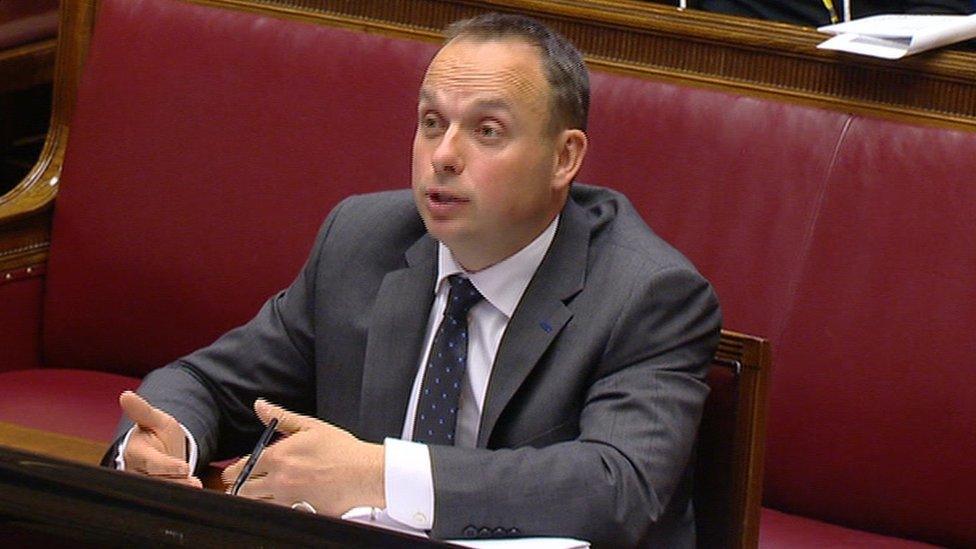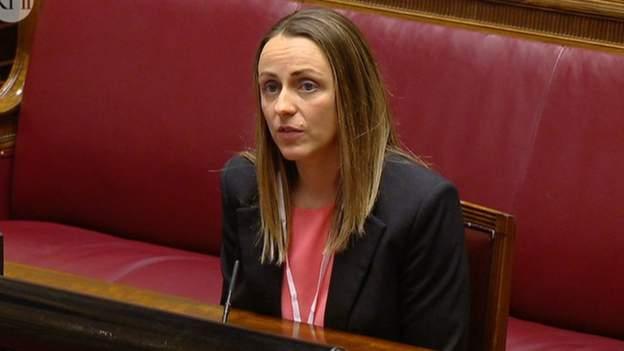RHI: 'Arlene Foster did not halt cost control plans'
- Published

Dr Andrew Crawford answers questions from the inquiry
Arlene Foster did not "jettison" plans for cost controls in the RHI scheme, her former special adviser has said.
Andrew Crawford was back giving evidence to the public inquiry into the flawed green energy scheme.
He said officials decided to park proposed cost controls and move ahead with the domestic scheme in late 2013.
Former Enterprise minister Mrs Foster and Dr Crawford were not told that a 10% target of renewable heat by 2020 was not achievable, the inquiry heard.
It was a Programme for Government target.
But a consultants' report in June 2013 had stated that it could not be met.
Inquiry counsel Joseph Aiken said the "first indication" of a plan to decouple cost controls from wider plans for the RHI scheme was in a submission to Arlene Foster in November 2013.
It was drawn up by the then head of the then Department of Trade and Investment's (DETI) enterprise division Fiona Hepper.

The inquiry was set up in response to public concern about the scheme's huge projected overspend
Incorrect assumption
It said a domestic RHI scheme could be launched ahead of proposals for phase two of the non-domestic scheme, which included a form of cost controls.
This was based on the incorrect assumption that the domestic scheme would not need approval under EU state aid rules, while changes to the non domestic scheme would.
In fact both required state aid sign off.
And the inquiry was also told that officials did not flag up issues around budget management in a letter from a UK government energy minister which pointed out cost control mechanisms in the scheme there.
It came from Greg Barker, the minister at the then Department of Energy and Climate Change in London.
'Decoupling'
The letter was sent in late 2013, around the same time that the "decoupling" of cost controls in the Northern Ireland scheme was being suggested.
Mr Aiken said the "central message" in the Greg Barker letter had been around budget management including cost controls.
But a DETI submission to Mrs Foster and Dr Crawford, based on the letter, did not highlight the issue.
Dr Crawford said it should have been used as an opportunity to reinforce the seriousness with which cost controls were being addressed in Great Britain.
He saw the submission but said he could not recall whether he asked to see the original letter from Mr Barker.
Panel member Dame Una O'Brien expressed surprise suggesting it was the kind of letter she would have expected would have been "one of the first documents you would reach for".
No cost controls in place
Later it was put to Dr Crawford that decisions by him and Mrs Foster effectively meant there were no cost controls in place.
It followed a submission by civil servants to proceed with the domestic scheme.
That was to be done before cost control work was undertaken.
Those cost controls were supposed to have been applied to both the domestic and the non-domestic scheme.
'No budget management'
Inquiry chairman Sir Patrick Coghlin said had Dr Crawford applied "any degree of concentration or analysis" he would have seen that the result would be that neither scheme would have any budget management mechanism.
Dr Crawford said at that stage the focus was on promoting the scheme not restricting it.
He said departmental officials were not telling him or the minister of the need for cost controls.
Sir Patrick said the decision to "decouple" the two schemes and delay the cost controls was a major departure from what had been publicly consulted upon.
He asked Dr Crawford what steps he had taken to intervene and ensure the minister made such a big call.
Dr Crawford said he could not recall what actions he had taken.
"Certainly there's nothing in writing," he said.
He said such a key decision should have come up for ministerial decision in the form of a submission.
He said he should have asked for one but there was no record of it in the system.
- Published30 May 2018

- Published9 May 2018

- Published18 May 2018
